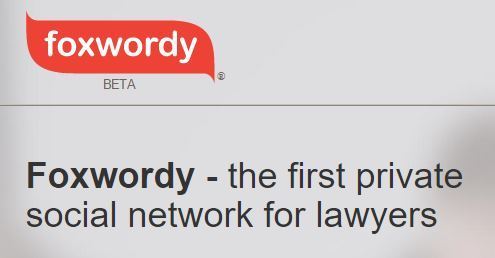Would you want to join a social network for lawyers whose basic marketing pitch is a lie?
Long-time readers of this blog will know that it bugs me when vendors make claims about their products or services that are not true. It makes me distrust the vendor and distrust its product.
So why does Foxwordy persist in claiming it is “the first private social network for lawyers”? That is not true by a long shot. And Foxwordy knows it is not true. I pointed it out in a post when the site first launched in February 2014 and I discussed the falsity of the claim with Foxwordy’s PR representative via email.
Yet there it is, right at the top of the Foxwordy home page.
Even worse, Foxwordy CEO Monica Zent relies on this falsehood at the reason lawyers should join her service. Here she is on YouTube, where she begins her video saying, “What makes Foxwordy different is we’re the first private social network for lawyers and law professionals.”
In fact, the first private social network for lawyers launched it 1993. It was called Counsel Connect and it was created by American Lawyer Media. No one called it a “social network” in those days but it was everything a social network is and a core activity was networking. It had lively discussion forums around a range of legal topics. It had libraries of legal resources. It had brief banks and online seminars.
And, yes, it was private — with membership limited to lawyers. As a matter of fact, that is precisely what I wrote about it in a 1995 column about it and another similar service, Law Journal Extra:
The best reason to join one of these lawyers-only services is for the opportunity to network with lawyers nationwide. Just about everything else they offer — e-mail, reference, news, etc. — can be found elsewhere online, at less cost. LCC and LJX offer the only places in Cyberspace where lawyers can hang out with other lawyers.
Have there been other private social networks for lawyers? Well, yes, actually. Scads of them.
As a matter of fact, way back in 2008, I wrote a column that surveyed networking sites that limited membership to legal professionals. Even, then, there were several.
At that time, the most successful of them was Legal OnRamp, which limited its membership to inhouse lawyers and their outside law firms. (The site has recently “relaunched” with a different structure.) It was started by the general counsel of nine blue chip companies, led by Cisco GC Mark Chandler, and its advisory board included David R. Johnson, the former Wilmer, Cutler & Pickering partner who was Counsel Connect’s chairman.
Of it, I wrote at the time:
Of the lawyers-only networking sites I looked at, this one seemed to offer the most promise for productive networking. With its three-fold focus on connections, community and content, it struck me as a next-generation iteration of a site that’s been defunct for decade, Counsel Connect, arguably the first networking site for lawyers.
But there were others back then, including LawLink, which survives still, and Lawyer-Link, which did not survive.
And there were others since. For one, who could forget the ABA’s ill-fated LegallyMinded, launched in 2008 and shut down in 2011?
So when Foxwordy launched in 2014, it was not the first private social network for lawyers. It was not even a close second or third. It was two decades behind the first private network for lawyers and well behind a host of others.
It is time for Foxwordy to find a new marketing slogan. And to find a better reason why lawyers should join.
See also:
 Robert Ambrogi Blog
Robert Ambrogi Blog